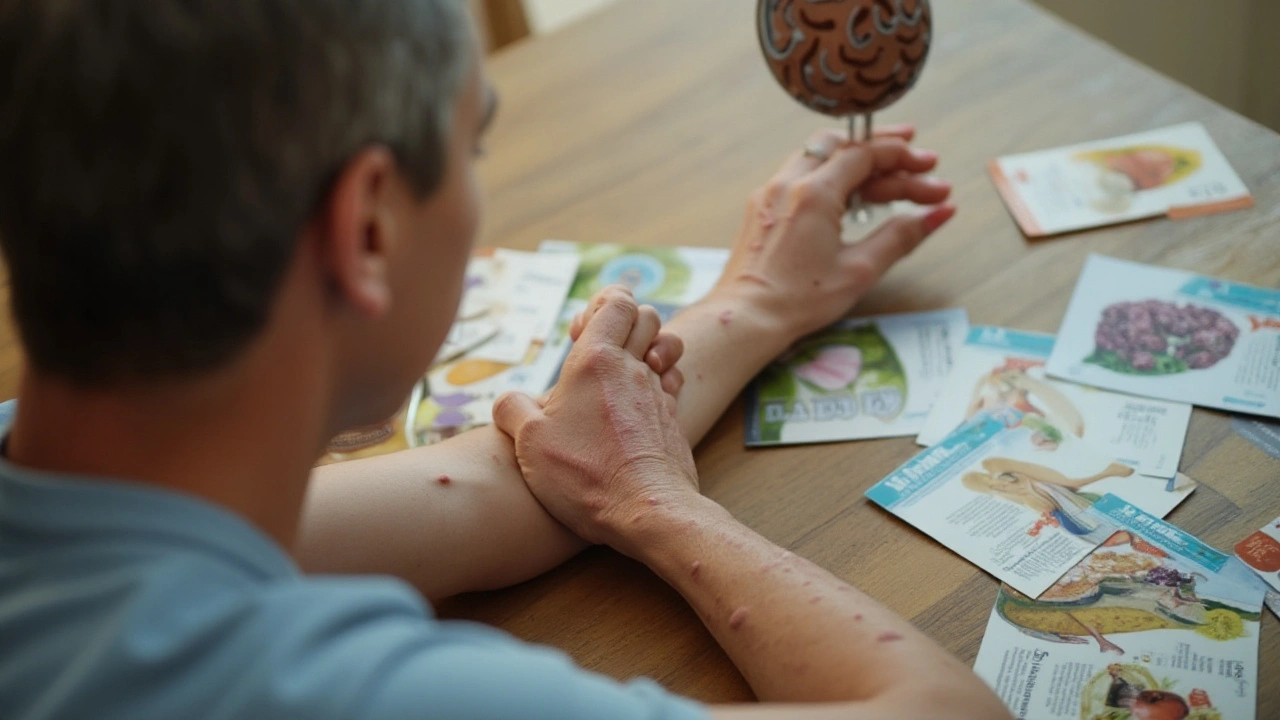Psoriasis: Practical Guide to Symptoms, Triggers & Treatments
Psoriasis is an immune-driven skin condition that causes red, scaly patches. It can show up on the elbows, knees, scalp, nails, or all over. Some people have tiny spots, others get large thick plaques. Psoriasis varies a lot from person to person, and that means the best approach is usually a mix of treatments and everyday habits.
How psoriasis looks and when to worry
Common signs are red patches with silvery scales, itch, burning, and nail changes (pitting or lifting). Types include plaque (most common), guttate (small spots), inverse (folds), pustular, and erythrodermic (widespread redness). If you get joint pain, morning stiffness, or swollen fingers/toes, ask your doctor about psoriatic arthritis — early treatment helps prevent damage.
What triggers flare‑ups — and how to avoid them
Triggers are very personal, but common ones include stress, infections (like strep throat), certain medicines, cold dry weather, heavy alcohol use, smoking, and sudden weight changes. Practical moves: treat infections fast, cut back on alcohol, stop smoking, use a humidifier in winter, and keep stress in check with small daily habits like short walks or breathing breaks. Track flare-ups in a simple notebook or phone photo log to spot patterns.
Treatments fall into three broad groups. For mild localized psoriasis, topical creams work well — steroid creams, vitamin D analogs (calcipotriol), coal tar, and regular emollients to lock in moisture. For moderate cases, your doctor may recommend phototherapy (controlled UV treatment) or oral drugs such as methotrexate, cyclosporine, or apremilast. Severe or stubborn psoriasis is often treated with biologics — drugs that target specific immune signals (TNF, IL-17, IL-23). These include medicines like adalimumab, secukinumab, and risankizumab. Biologics require screening (TB, hepatitis) and regular follow-up.
Side effects and monitoring matter. Oral and biologic drugs can change liver tests or affect your immune system, so labs and sometimes vaccinations are needed before starting. If cost is a worry, ask your pharmacist about coverage, biosimilars, or patient support programs — options differ across plans and provinces.
Daily care helps a lot. Use a fragrance-free moisturizer after showers, avoid very hot water, pat skin dry, and avoid harsh scrubs. For scalp psoriasis, medicated shampoos with coal tar or salicylic acid can help. Gentle sun exposure can improve symptoms for some people, but avoid burns and discuss safe limits with your provider.
Want a next step? If your symptoms are mild, try a consistent skin care routine and a medicated topical from your pharmacist. If plaques cover large areas, affect your quality of life, or you have joint symptoms, see a dermatologist or rheumatologist for a tailored plan. Bring photos, a list of triggers, and any previous treatments — that speeds up finding what works for you.
Nebivolol and Psoriasis: Can This Medication Improve Your Skin?
Exploring the potential benefits of Nebivolol for those suffering from psoriasis. The article delves into whether this medication, commonly used for heart conditions, can offer relief for skin-related issues. It covers basic information about psoriasis, Nebivolol’s mechanism, and tips for managing skin health.
